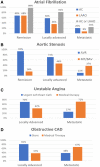Preferences and Attitudes of Cardiologists in Management of Patients with Cancer
- PMID: 36479547
- PMCID: PMC9712055
- DOI: 10.1089/pmr.2022.0014
Preferences and Attitudes of Cardiologists in Management of Patients with Cancer
Abstract
Background: With recent improvements in survival of cancer patients and common use of high-value care at end of life, the management of cardiovascular disease (CVD) in patients with cancer is increasingly important. To our knowledge, there are no current U.S. data examining how the presence and extent of cancer influence cardiologists' decision making for common cardiovascular conditions.
Methods: An anonymous online vignette-based survey of cardiologists was conducted at five U.S. institutions investigating how the extent of gastrointestinal and thoracic malignancies (prior/localized, metastatic) would influence treatment recommendations for atrial fibrillation (AF), aortic stenosis, unstable angina (UA), and obstructive coronary artery disease (CAD).
Results: Thirty-three percent (86/259) of cardiologists completed the survey between September and November 2019. Participants were 67% male, 51% below age 40, and 58% had five or more years of clinical experience. Majority of cardiologists practiced at teaching hospitals (72%) and were noninterventional (63%). Cardiologists were more likely to recommend procedural interventions for patients with localized cancer than for those with metastatic disease: AF (left atrial appendage occlusion: 20% vs. 8%), atrial stenosis (aortic valve repair: 83% vs. 11%), UA (left heart catheter: 70% vs. 27%), and obstructive CAD (percutaneous coronary intervention: 81% vs. 38%). In patients with metastatic cancer, most cardiologists sought an oncology (82%) or a palliative care (69%) consultation. However, a persistent trend of undertreatment in patients with localized cancers and overtreatment in patients with end-of-life disease was apparent.
Conclusions: Cardiologists were less likely to recommend invasive cardiovascular therapies to patients with metastatic cancer. This preference pattern likely reflects the influence of comorbidities and quality of life expectation on cardiologists' treatment recommendations but may also be related to the stigma of advanced cancer. Better communication between cardiologists and oncologists is necessary to provide a personalized care of patients with cancer and CVD that would maximize treatment benefit with least morbidity.
Keywords: cardio-oncology; high value care; physician communication.
© Ibrahim Azar et al., 2022; Published by Mary Ann Liebert, Inc.
Conflict of interest statement
P.A. P.: honoraria—Array BioPharma; AstraZeneca; Bayer; Blueprint Medicines; Celgene; Ipsen; Merck; Syncore; TriSalus Life Sciences. Consulting or advisory role—Celgene; Daiichi Sankyo; Ipsen; Merck; Syncore; Taiho Pharmaceutical; TriSalus Life Sciences. Speakers' bureau—Bayer; Celgene; Incyte; Ipsen; Novartis. Travel, accommodations, expenses—Abbvie; Celgene; Rafael Pharmaceuticals. Uncompensated relationships—Caris MPI; Rafael Pharmaceuticals. A.F.S.: consulting or advisory role—Caris Life Sciences; ImaginAb. Speakers' bureau—Caris Life Sciences. Travel, accommodations, expenses—Caris Life Sciences; GE Healthcare; ImaginAb; Inovio Pharmaceuticals; TransTarget. H.M. is a consultant for Zentalis and has been a consultant for AstraZeneca, Caris Life Sciences, and Takeda.
Figures
References
-
- Jemal A, Ward E, Hao Y, et al. . Trends in the leading causes of death in the United States, 1970–2002. JAMA 2005;294(10):1255–1259. - PubMed
LinkOut - more resources
Full Text Sources
Miscellaneous

